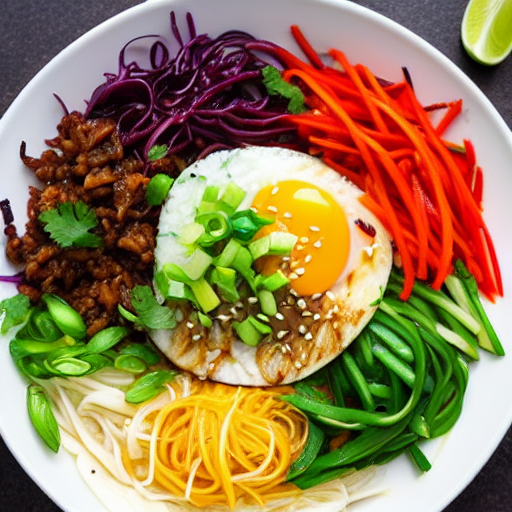Bibimbap Noodles
Bibimbap Noodles is a delicious fusion dish that combines the vibrant flavors of traditional Korean bibimbap with the comforting texture of pasta. This Halal-friendly recipe features a colorful array of vegetables and a savory sauce that will delight your taste buds.

30 minutes
Difficulty: Medium
Korean
550 kcal
Ingredients
- Spaghetti or udon noodles - 200 grams
- Cucumber - 1 small, julienned
- Carrot - 1 medium, julienned
- Zucchini - 1 small, julienned
- Mushrooms (shiitake or button) - 100 grams, sliced
- Eggs - 2, fried or poached
- Soy sauce (Halal) - 2 tablespoons
- Gochujang (Korean chili paste) - 1 tablespoon
- Sesame oil - 1 tablespoon
- Garlic - 2 cloves, minced
- Green onions - 2, chopped
- Sesame seeds - 1 tablespoon, toasted
- Salt - to taste
- Pepper - to taste
Steps
- Cook the spaghetti or udon noodles according to package instructions. Drain and rinse under cold water, then set aside.
- In a large skillet, heat sesame oil over medium heat. Add minced garlic and sliced mushrooms, sautéing until mushrooms are tender, about 3-4 minutes.
- Add the julienned cucumber, carrot, and zucchini to the skillet. Stir-fry for an additional 3-5 minutes until the vegetables are slightly tender but still crisp. Season with salt and pepper to taste.
- In a small bowl, mix together the soy sauce and gochujang until well combined. Pour this sauce over the cooked noodles and toss to coat evenly.
- Add the sautéed vegetables to the noodles and mix gently until everything is combined.
- Divide the noodle mixture into two bowls. Top each serving with a fried or poached egg, chopped green onions, and a sprinkle of toasted sesame seeds.
Nutrition
- Calories: 550
- Protein: 20 g
- Carbs: 75 g
- Fiber: 5 g
- Sugar: 4 g
- Sodium: 800 mg
- Cholesterol: 186 mg
- Total Fat: 18 g
- Saturated Fat: 3 g
- Unsaturated Fat: 15 g
- Water: 0.5 L
Health Benefits
- Rich in vitamins from the fresh vegetables.
- Provides a good source of protein from the eggs and noodles.
Tags
KoreanHalalPasta Dish